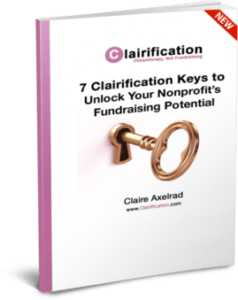 Has this really been going on this long?
Has this really been going on this long?
Way back in March and April of 2020 I wrote a bunch of articles about crisis fundraising, donor communications in the time of corona and how to adapt your management and planning. Feel free to join me for a walk down memory lane here, here, here, here, here, here, here, here, and here.
Honestly, I’ve been continuing ever since then with as many helpful tips and concrete examples I could dream up and offer.
Today, I’d like to revisit something absolutely fundamental.
It’s not a tip or a tactic. It’s a modus operandi.
Eight months ago Joan Garry wrote True Leadership in the Time of Corona, an awesome piece I commend to you in full. At the time, we were grappling with the first wave. Now, as we head into a long winter, the lessons from this article are worth revisiting.
As tempting as it may be to pretend everything will soon be ‘normal,’ that’s unlikely. And good leaders don’t bury their heads in the sand. They plan ahead for crisis contingencies.
Leaders ask the key questions:
- What if this happens?
- If it does, then what?
- And then?
- And then?
- And then?
- … until there are no more “and thens?” to ask.
I call this the Cassandra role.
I confess to being a bit of a Cassandra. I often play the role of “loving critic.” Generally people don’t appreciate Cassandras in the moment, but they’re essential in times of crisis. As a leader, you sometimes must adopt this role.
Someone has to confront the elephant in the room and ask the probing questions:
- What if this happens?
- If this happens, what can we do?
- If we do that, what might happen as a result?
- If that happens, what would we do then?
You will be confronted by people who say “Oh, that’s unlikely” or “This can’t happen here” or “That’s pretty unrealistic” or even just “Don’t be such a ‘cup half empty’ person.” It’s tough, but you must ignore them.
Instead of giving in, or succumbing to the temptation to just play the ‘nice guy,’ tell folks you hope and pray the worst case scenario never arrives. But, just in case, it can’t hurt to anticipate and plan for what it might look like. I live in California, and we’re always worried about the ‘Big One,’ so we stock up on earthquake supplies. If we’re fortunate, we never have to use them. If not, we’re prepared.
There is a big difference between “getting lucky” and “being prepared.”
Leaders don’t count on getting lucky. That would be like failing to study for a test, hoping you’ll get lucky by guessing the right answers. You might, but it’s a pretty clueless strategy. Your job is to look for and find the clues to what may lie ahead.
Savvy leaders:
- Anticipate problems.
- Brainstorm solutions.
- Build coalitions to evaluate and prioritize solutions.
- Develop written plans to address problems, present and anticipated.
- Take reasonable, considered actions to solve pressing problems and mitigate against new problems arising.
What could lie ahead?
If your first impulse was to answer this question beginning with “I hope…” you’re on the wrong track.
Leaders must, of course, be hopeful. People, after all, naturally follow optimists. But that’s not the same thing as tying your fortunes to what you ‘hope’ will happen.
If what you hope for doesn’t happen, then what?
Today is not a time of “all things being equal, we should be fine.” All things are decidedly not equal right now.
Spend some time brainstorming alternative scenarios over which you have no control.
Right now this might include:
- What happens if our staff get sick?
- What happens if our clients get sick?
- What happens if we lose a major supporter?
- What happens if our federal, state or local government closes things down more?
- What happens if our federal, state or local government opens things up more?
- What happens if, despite what’s permitted, people are afraid to get involved?
- What happens if our reserves run out?
- What happens if we must continue with reduced staffing for 3, 6, 12 or more months?
- What happens if another act of nature (e.g., fire, tornado, hurricane, earthquake, drought, famine, terrorism, a new virus) is layered on top of the coronavirus?
Be ever mindful of your mission.
This should be your north star, during good times and bad.
Which is why it’s not a bad time – right now – to revisit and even rethink your mission so you get to the roots of why you do what you do.
- Consider why people rely on you.
- Consider why people seek you out.
- Consider why people support you.
- Consider what would happen should you, or some of your programs, cease to exist.
Whatever you do, your constituents believe it’s important.
They don’t think “Gee, I don’t think the symphony is important anymore because we’re in a pandemic so, really, who cares?”
In fact, they probably miss you more than ever and have a renewed appreciation for the power of music to stir and soothe the soul. So making sure people can enjoy music, and that the symphony will make it through to the other side to once again do it’s job (Nietzche wrote: “Without music, life would be a mistake.”), will make total sense to the people who love you.
Don’t forget your vision.
More than ever before nonprofit leaders must lead from vision (brand promise), not mission (programs and process).
In other words, just because the programs and services you’re offering right now may be different than those you would offer were there not a wildly raging pandemic, the vision those programs are designed to serve has not altered.
Never lose sight of the change you’re endeavoring to bring about. That’s the promise folks want to invest in. Positive, transformative change.
Leaders must persuade followers — supporters — the why of your existence matters.
It is your vision’s beating heart and pulsating rhythm.
Your vision is your ‘theme song.”
What is yours?
I love Seth Godin, and this one just happened across my transom. Had to share.
Second cousins
Being smart often has little to do with being persuasive.
And yet we often assume that one leads to the other.
We spend years and years educating people to do well on tests in the belief that this will make them smart.
And we assume that they’ll figure out the persuasive stuff on their own.
We conflate the two on a regular basis, assuming that charisma or followers or influence is somehow aligned with insight, foresight, and learning.
The good news is that being persuasive is a skill. If you’re smart, we’ll all benefit if you’ll also invest the effort to find a way to lead.
Want to Unlock Your Nonprofit’s Potential?
 Most people don’t learn how to lead a nonprofit (or to lead from within a nonprofit) in school. Yet there are, in fact, poor, fair, good and even better practices.These just aren’t things must of us are taught. And it’s sometimes hard to sort them out on your own. Especially when practices evolve and change. Which is why I wrote the 7 Clairification Keys, offering fresh insights into how fundraising and marketing have changed more in the past eight years than in the previous 50 – and what that means for you and your organization.
Most people don’t learn how to lead a nonprofit (or to lead from within a nonprofit) in school. Yet there are, in fact, poor, fair, good and even better practices.These just aren’t things must of us are taught. And it’s sometimes hard to sort them out on your own. Especially when practices evolve and change. Which is why I wrote the 7 Clairification Keys, offering fresh insights into how fundraising and marketing have changed more in the past eight years than in the previous 50 – and what that means for you and your organization.
You’ll learn to ‘clairify’ your (1) brand, (2) stories, (3) values, (4) social channels, (5) support constituencies, (6) engagement objectives and (7) resources/systems through a series of worksheets and individual and group exercise. If finding sustainable sources of financing to ensure furtherance of your nonprofit mission is an ongoing struggle, it may be time to tinker with your system. Especially now. And since all Clairification products come with a 30-day, no-questions-asked, 100% refund guarantee, you can’t lose.
Yes, that’s me in the photo. Heading out to buy some bread and veggies. I try to be task-focused to minimize my time in the store (good leaders think about ROI), yet I acted on inspiration when I saw a wrapped snickerdoodle cookie. Creative brainstorms are okay too. Take good care and try to find some balance.





